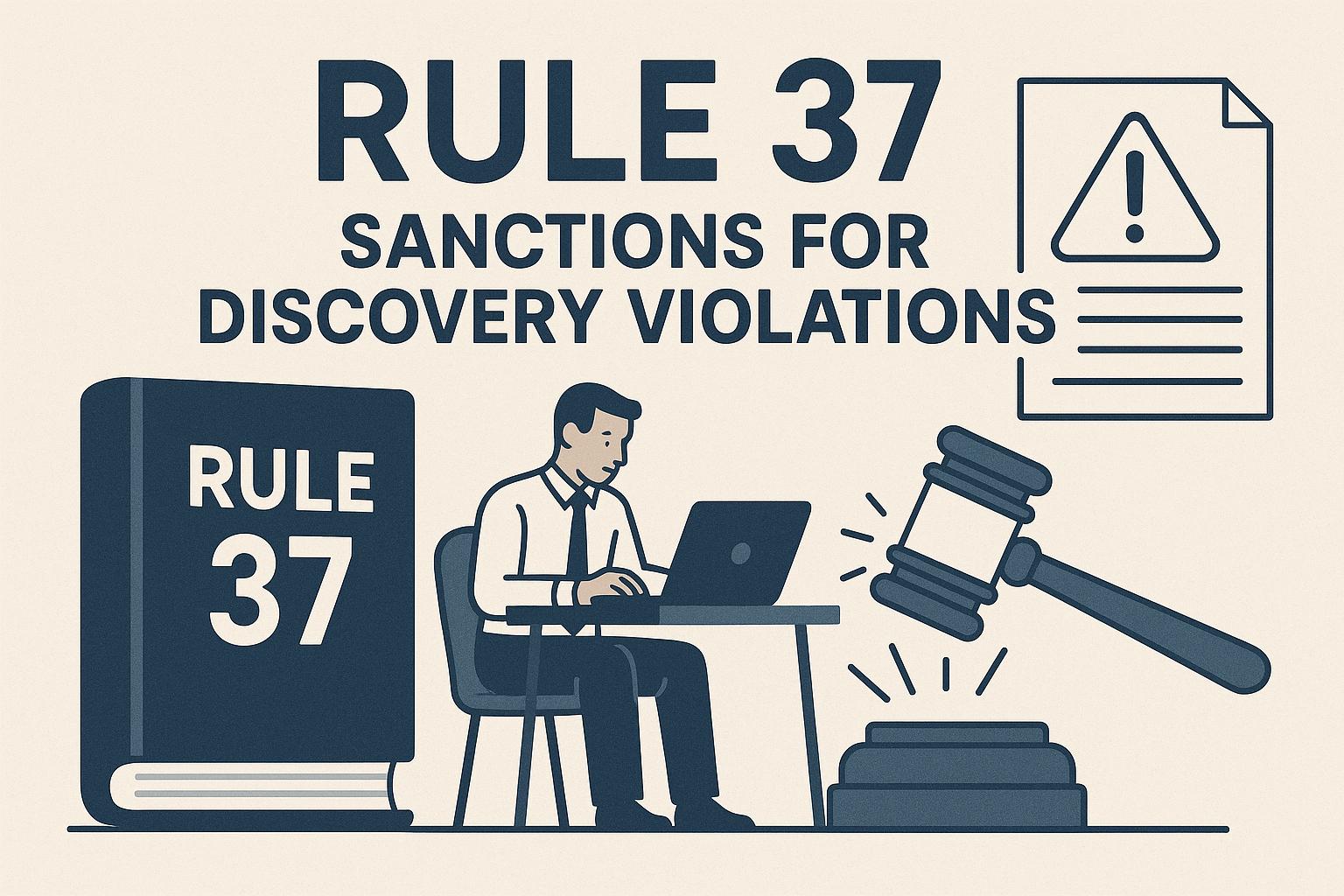Understanding Rule 37 Sanctions for Discovery Violations
In the United States legal system, the discovery process is essential to securing a fair trial. By providing both parties access to critical evidence, discovery ensures that neither side is unfairly disadvantaged. The Federal Rules of Civil Procedure (FRCP) establish various guidelines for discovery, with Rule 37 playing a key role in enforcing these guidelines. This rule is indispensable because it holds parties accountable for violations, promoting accountability and adherence to discovery obligations.
What is Rule 37?
Rule 37 is fundamentally about the consequences faced by parties that fail to meet their discovery obligations. Discovery requires parties to engage in specific activities such as answering interrogatories, producing documents, and allowing inspections. Should any party fail to comply with these requirements, courts have the authority to impose sanctions under Rule 37. The primary aim is to penalize non-compliance while deterring similar conduct in the future. This approach sustains the integrity of the discovery process by ensuring that the rules are followed.
Types of Sanctions
The sanctions under Rule 37 are varied to address different levels and types of non-compliance. Their severity ranges from minor financial penalties to more significant legal consequences:
Monetary Sanctions: One of the more straightforward penalties, this involves requiring the offending party to cover the reasonable expenses of the opposing party, including attorney fees. These are specifically related to efforts expended due to the violation.
Issue-Related Sanctions: This type empowers courts to suppress specific pieces of evidence, prevent parties from making arguments related to certain facts, or dictate that certain facts must be accepted as established, thereby impacting the case’s outcome.
Striking Pleadings: In more severe violations, a court might decide to strike offending parts or even entire pleadings. This action can severely impact a party’s ability to present its case, effectively weakening its position in litigation.
Contempt of Court: In certain instances, contempt sanctions are applicable. Parties found in contempt may face fines, or in extreme circumstances, the court could impose jail time on offending attorneys or individuals.
Default Judgment and Dismissal: For the most egregious violations, a court may decide to enter a default judgment against the offending party or dismiss their claims altogether, potentially ending the case in favor of the compliant party.
Conditions for Imposing Sanctions
The application of Rule 37 sanctions is not arbitrary and requires a showing of some level of fault by the non-compliant party. Sanctions are more likely to be imposed if there is evidence of willful misconduct or bad faith, distinguishing these from mere oversights or mistakes. Courts typically consider factors such as the reasons for non-compliance, any demonstrated prejudice to the opposing party, and whether less severe sanctions might have sufficed.
Good Faith Attempts at Compliance
Rule 37 also recognizes efforts by parties to comply in good faith. If there is evidence that a party made genuine efforts to comply with discovery requests, courts are less likely to impose severe sanctions. This provision ensures that parties acting in good faith are not unfairly punished for unavoidable errors or misunderstandings.
Procedural Aspects
To seek sanctions under Rule 37, a party typically files a motion with the court. This process requires the motion to demonstrate the non-compliance and specify the desired sanctions. Once submitted, the court evaluates the motion to decide whether the suggested penalties should be implemented based on the merits of the case.
Judicial Discretion and Decision-Making
Courts hold substantial discretion when it comes to determining appropriate sanctions. Judges are tasked with evaluating every aspect of the alleged non-compliance, which includes considering explanations offered by the offending party and assessing the impact on the case’s fairness. Importantly, the guiding principle is to balance penalizing improper conduct without overburdening the offending party excessively or disproportionately.
Implications for Legal Practice
Legal professionals must closely examine Rule 37 to ensure they comply with discovery rules. Failure to appreciate the complexities and potential consequences of these sanctions can significantly impact a case. Lawyers are encouraged to maintain meticulous records, communicate openly with opposing counsel, and proactively address discovery-related issues before they escalate to sanctionable conduct.
Conclusion
In conclusion, Rule 37 is integral to maintaining fairness and integrity within the discovery process. By imposing penalties for violations, the rule incentivizes parties to strictly adhere to their discovery obligations. For legal professionals, understanding the implications of Rule 37 sanctions is crucial for navigating the complexities of discovery effectively. Mastery of this rule not only aids in avoiding negative consequences but also reinforces the principles of fair play and responsibility in legal practice.
